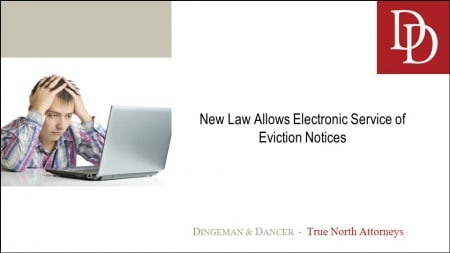
New Law Allows Electronic Service of Eviction Notices
This past year, Governor Snyder signed into law House Bill 4038 (“HB 4038”). The new Michigan law, which amends Section 5718 of Michigan Summary Proceedings Act, gives landlords the ability to serve eviction notices via electronic means such as email, provided that a tenant has provided prior consent and supplies the landlord with an email address.
Notices to quit (or demands for possession) are very important documents for eviction proceedings. If they are not served properly or completed correctly, courts may throw out an eviction complaint. In light of today’s technology, the new electronic service option seems like an obvious progression that should benefit both landlords and tenants.
If utilized correctly, electronic service should provide adequate notice and eliminate sources of potential confusion over service. From tenants’ perspective, this change is ostensibly an improvement because it ensures that notices are delivered quickly and not lost in the mail. Landlords will similarly benefit from the new law through increased efficiency and cost savings. But before deciding to make use of the new option, it is important for landlords to understand the law and its restrictions.
The law previously required landlords to serve tenants with demands for possession or payment by personal delivery or first class mail. Under the amended act, electronic service is permitted provided that (1) the person in possession of the property has specifically consented in writing to electronic service of the demand, and (2) the consent or a confirmation of the consent has been sent by one party and affirmatively replied to, via electronic transmission, by the other party.
If a tenant informs his or her landlord in writing of a new email address or that the tenant no longer uses the email address, then the landlord can no longer use the original email address. Alternatively, instead of sending notices via email, landlords may opt to utilize a system by which tenants receive electronic notice that directs them by hyperlink to an internet location, where they can open and download the notice.
Michigan landlords intending to implement electronic service should attempt to obtain the required consent at the time of signing of lease agreements. It is important note that under the new law, landlords cannot refuse to execute a lease because a prospective tenant will not consent to the electronic service.
Landlords and tenants may wish to consider this statutory amendment when negotiating and executing their leases. Feel free to contact our firm with any questions regarding the new law.